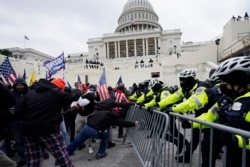The United States is creating a new unit to help investigate and prosecute cases of domestic terrorism, citing a rising threat and a growing caseload.
Assistant U.S. Attorney General Matthew Olsen told lawmakers Tuesday he was establishing the new unit as part of the Justice Department’s National Security Division to “ensure that these cases are handled properly and effectively."
"The threat posed by domestic terrorism is on the rise," Olsen said during testimony before the Senate Judiciary Committee. "We've seen a growing threat from those who are motivated by racial animus as well as those who ascribe to extremist anti-government and anti-authority ideologies.”
Olsen said the number of domestic terrorism investigations initiated by the Federal Bureau of Investigation has more than doubled since March 2020, and that U.S. intelligence officials expect the threat to persist.
Olsen’s testimony comes less than a week after the U.S. marked the first anniversary of the January 6 riot at the U.S. Capitol.
To date, more than 725 people have been arrested for their roles in the riot. More than 325 of them have been charged with felonies.
In September, FBI Director Christopher Wray told lawmakers that the bureau’s domestic terrorism caseload “has exploded,” and warned the prevention of terrorist attacks would be the FBI’s top priority “for the foreseeable future.”
On Tuesday, FBI Executive Assistant Director Jill Sanborn told lawmakers domestic violent extremists carried out four attacks in 2021, leading to 13 deaths.
“Many domestic violent extremists also plotted to conduct attacks due to personalized grievances, including anger at government responses to COVID-19, immigration policies and perceived election fraud," Sanborn said.
“We assess domestic violent extremist reactions to socio-political events and conditions will continue to drive the threat of violence,” she said. “Racially or ethnically motivated violent extremists and anti-government or anti-authority violent extremists will continue to pose the most serious threats."
An unclassified U.S. intelligence assessment released in March warned of a broad threat from domestic extremists, focusing its concern on lone offenders and small cells, all subscribing to a diverse set of violent ideologies but "galvanized by recent political and societal events."
President Joe Biden released a strategy to confront domestic terrorism last year, which called for hiring additional domestic terrorism analysts, investigators and prosecutors.
During Tuesday’s hearing, the ranking Republican on the Senate Judiciary Committee, Chuck Grassley, criticized the Biden strategy for focusing too heavily on the January 6 riot at the U.S. Capitol and ignoring what he described as anti-police riots that “rocked our nation for seven full months.”
“There was almost no mention of leftwing terrorism at all,” Grassley said in his opening statement, further citing testimony by FBI Director Wray about “weaknesses in the left-wing domestic terrorism program that had prevented the FBI from getting the visibility they needed into the riots from that time to now.”
Senate Judiciary Committee Chairman Democrat Dick Durbin charged in his opening remarks that the threat landscape has been more dangerous by Republican lawmakers who have come out in support of allegations by former President Donald Trump.
“They have rationalized the worst assault on our Capitol since the War of 1812,” Durbin said. “And, in turn, they are normalizing the use of violence to achieve political goals.”









